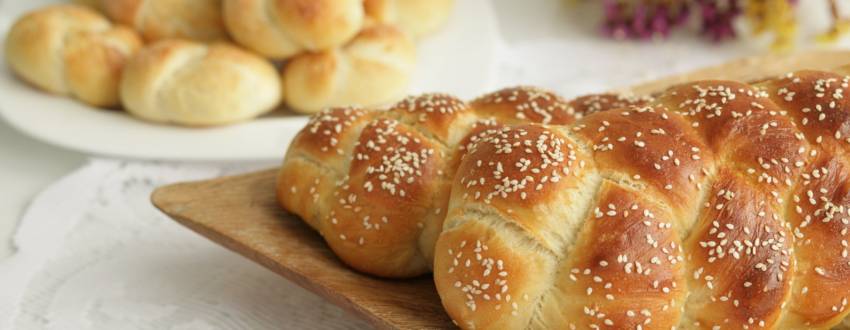I’ve spent many years of my life attempting to perfect the art of challah baking and in the course of that time, thousands of people have asked me their challah questions. I think one of the biggest headaches for many challah bakers is when you spend so much time making and shaping what should be beautiful challahs…but then they seem to open up while in the oven, cracking and stretching all over. I’ve certainly had it happen to me too and I know it can be so frustrating!

Do I ever know where you are coming from!!
I went through a very difficult stage where my challahs seemed to break and stretch all over the place, no matter how carefully I braided them…and the most maddening part of it was that I had no idea why. I asked a zillion people for advice; I tried changing the type of yeast I used, the freshness of the yeast, the amount of yeast, different types of flours, different amounts of rising as well as baking times, challah recipes, oven temperatures…you name it, I tried it.
Until I finally found out what was wrong by a hint I got from my friend Batsheva Schreiner of Schreiner’s challahs…
Batsheva listened to my challah woes and in the middle of it she said to me: “Wow, it sounds to me like the gluten in your challahs has not been activated enough…”
BINGO. That was the answer.
Here is what I do now, always, without fail, every single time I make challahs.
When you put your dough together, in order to ‘activate the gluten’ you must knead the dough for enough time. During the first round of kneading I set an actual timer (my mixer has one on the mixer itself) for 10 or 12 minutes and I knead the dough that amount of time. Then I turn off the mixer, or if doing it by hand, I stop kneading and let the dough rest. I cover it loosely with plastic while it is resting. Ten to fifteen minutes is enough time for it to be ready for you to go on to the next step.
After this ‘rest period’ I then knead the dough once more for an additional four minutes. That’s all. This second kneading activates the gluten. You can even see it in the dough itself because it should be, by now, elastic, smooth and nice to the touch.
Another way you can check if the dough is activated is by making one strand. If you can easily roll it out longer without it stretching and breaking right away (of course it will if you roll it too much, though!) then you know it worked.
Try these tips. It is sure to enhance your challah dough and thereby also enhance the beauty of your finished challahs.
Another secret I learned out of this: the key to making gorgeous challahs is not mainly in the way it is shaped – it’s mainly in the quality of the dough you have created. Therefore, if you want all the hard work you put into your homemade dough and the shaping you are going to do to be successful, you must first ensure that your dough will be a great one! For that I have this list of important tips for how to make a gorgeous dough.
Need help making your dough as smooth and perfect as possible? Try these steps here!
Need a recipe for great challah dough? Click here to receive a download of Tamar Ansh’s Incredible Challah Dough recipe card.
In my book A Taste of Challah, I show many different ways to shape beautiful challahs. Here’s one I’d like to share with you right now – and there are plenty more in the book, photographed step by step.
To create a very simple round shape that comes out beautiful – even if you have little or no experience shaping rounds – try this.
Instructions for a Braided Round Challah:
- Cut off three pieces of dough weighing approximately 100 grams each. (This way you will have a medium sized challah of about 300 grams in weight before being baked.)
- Roll out the pieces as long as possible without breaking them and without turning them into strands that are too thin.
- Braid these three strands together. You should now have a long ‘havdallah shaped’ long challah.
- Pick it up and quickly knot it, the way you would knot an ordinary small roll.
- Line a baking tray with parchment paper and then place your challah on it.
- Let it rise, covered loosely with plastic, for 35 minutes.
- Preheat your oven to 375°F / 195°C.
- Beat one egg in a glass and brush your challah with this beaten egg.
- Top your challahs with any variety of seeds you enjoy.
- Slide your challah (challahs) into the oven and bake for 30 minutes, or until it is browned both on top and on bottom.
- Let them cool off on wire racks. When completely cooled, slide them into heavy duty freezer bags and freeze until the day you are using them.
Enjoy your challah baking!
All the best,
Tamar Ansh






didn’t work for me!
I use high gluten flour and once my dough is all mixed let it stay on high for 10 full minutes (I use a Bosch). Recently I noticed that my challahs started cracking more. I tried your methods and it didn’t work, it actually made it worse! What I found after trial and error was not to let the dough rise too long, both before and after braiding. That helped me a lot.